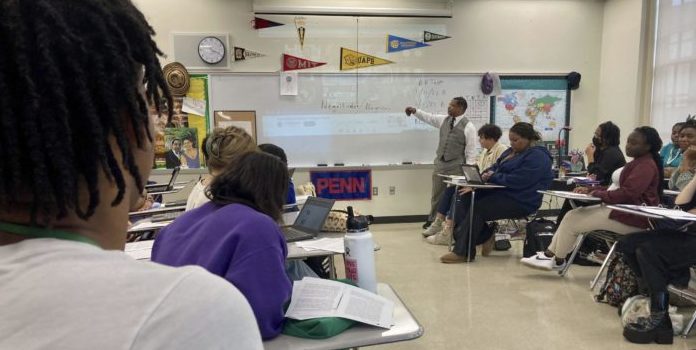(Headline USA) The official curriculum for a new Advanced Placement course on African–American studies that was released on Wednesday downplays some components that drew criticism from conservatives including Florida Gov. Ron DeSantis, who had threatened to ban the class in his state.
In the new framework, topics including Black Lives Matter and queer life are not part of the exam. They are included only on a list of sample project topics that states and school systems can choose from for assignments.
The course is currently being tested at 60 schools around the U.S., and the official materials are intended to guide its expansion to hundreds of additional high schools in the next academic year.
The College Board, which oversees AP courses, said developers consulted with professors from more than 200 colleges, including several historically black institutions.
The rejection of the course by DeSantis has stirred new political debate over how schools teach about race following widespread parental outrage over student indoctrination in areas including the pro-Marxist Critical Race Theory.
In January, Florida issued a chart that said the course promotes the idea that modern American society oppresses black people, other minorities and women, includes a chapter on “Black Queer Studies” that the administration finds inappropriate, and uses articles by critics of capitalism.
Despite the lies from the Biden White House, Florida rejected an AP course filled with Critical Race Theory and other obvious violations of Florida law. We proudly require the teaching of African American history. We do not accept woke indoctrination masquerading as education. pic.twitter.com/Anw7Ui2JJv
— Manny Diaz Jr. (@SenMannyDiazJr) January 20, 2023
The Florida Department of Education told the College Board it would bar the course unless changes were made.
DeSantis, a possible Republican presidential candidate in 2024, said he was blocking the course in Florida because it pushes a political agenda.
“In the state of Florida, our education standards not only don’t prevent, but they require teaching black history, all the important things. That’s part of our core curriculum,” DeSantis said at a news conference last week. “We want education and not indoctrination.”
In a written statement Wednesday, College Board CEO David Coleman claimed the course is “an unflinching encounter with the facts and evidence of African American history and culture.”
“No one is excluded from this course: the black artists and inventors whose achievements have come to light; the black women and men, including gay Americans, who played pivotal roles in the Civil Rights movements; and people of faith from all backgrounds who contributed to the antislavery and Civil Rights causes. Everyone is seen,” he said.
Among the schools piloting the new course is Baton Rouge Magnet High School in Louisiana.
Earlier this week, students read selections of “The Wretched of the Earth” by Frantz Fanon, which deals with the violence inherent in colonial societies.
In a lively discussion, students connected the text to what they had learned about the conflict between colonizers and Native Americans, to the war in Ukraine and to police violence in Memphis, Tennessee.
“We’ve been covering the gamut from the shores of Africa to where we are now in the 1930s, and we will continue on through history,” said course instructor Emmitt Glynn.
The College Board offers AP courses across the academic spectrum—including math, science, social studies, foreign languages and fine arts. The courses are optional. Taught at a college level, students who score high enough on the final exam usually earn course credit at their university.
The African–American studies course is divided into four units: origins of the African diaspora; freedom, enslavement and resistance; the practice of freedom; and movements and debates.
In Malcolm Reed’s classroom at St. Amant High School in Louisiana, where he teaches the AP class, he tries to be mindful of how the material and discussions can affect students.
“I give them the information and I’ve seen light bulbs go off. I ask them, ‘How does it affect you? How do you feel about learning this?’ ” he said. “It’s also new for me, and I’m just taking it in stride. We’re not just learning history, but we’re making history.”
Adapted from reporting by the Associated Press

